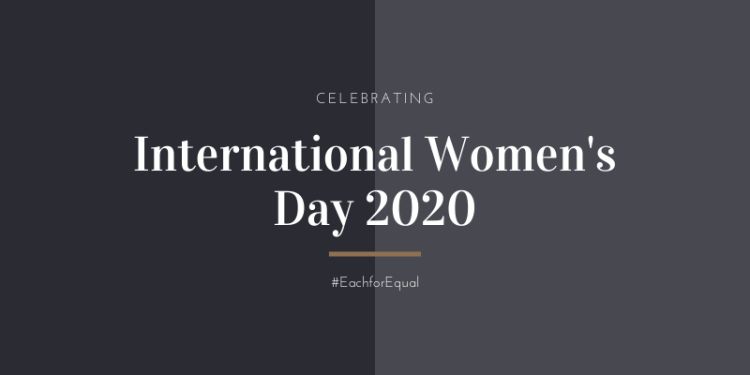Celebrating International Women’s Day 2020

On International Women’s Day, we are reminded to celebrate the women in our lives and the social, economic, cultural and political achievements of women across the world.
This year’s International Women’s Day campaign theme, #EachforEqual, urges us to think about our responsibility to help build a more balanced and equitable world, as well as our individual power to help influence change.
We, at the Management Division, think the day is a great opportunity to recognise the amazing women who we work with and to ask them to shed light on their experiences of being a woman in this profession.
We spoke to Dr Kerrie Unsworth, Professor of Organisational Behaviour at Leeds University Business School. With a background in psychology and a keen interest in how we can make the world a better place, Kerrie shared some of her experiences and what International Women’s Day means to her.
“To me, International Women’s Day is a necessary stepping stone towards International Every Person’s Day.
Let me explain…As a young female researcher and PhD student in the late 1990s, I remember staunchly arguing with anybody who hinted that I might have had to fight discrimination. At the time, it felt like that would be disrespectful to the many people who had supported me along the way.
Looking back now, I see the world differently and don’t think of discrimination as “blaming” or as a deliberate or conscious act. I can see now that I did suffer from various acts of discrimination; that the people involved did not mean to harm me, in fact, they probably often thought they were doing the best thing for me, because it was what they perceived to be best.
They couldn’t see that as a young female I brought something different. Raising awareness about the differences we all bring, how we are challenged by our work situations, and how we build alternative strengths, is incredibly important.
What International Women’s Day means to me is that we learn to look at the world through other people’s eyes rather than assuming we are the only ones with 20:20 vision.
This is hugely insightful, and it comes as no surprise to learn that Kerrie is particularly interested in learning about how we can make work-life work for everybody. As women, this is something which can often become a struggle; as highlighted by Dr Helen Hughes, Associate Professor at the Business School and Programme Director for the MSc in Organizational Psychology. Helen explained:
“I am an Associate Professor and Chartered Occupational Psychologist, and I have worked in the Business School since 2006. I grew up in a household where my Mum - seemingly effortlessly - held down a full-time job as a teacher, and I don’t think it ever occurred to me that being a woman in the workplace might come with challenges until I had my children, and realised what ‘juggling work and home’ really meant!
I think my biggest workplace achievement was completing my (part-time) PhD, whilst maintaining a full-time academic job, and having two children under five. I couldn’t have achieved this without the tremendous support of my family and friends (both the men and women in my life!). I will always be grateful for their support, encouragement, and unfaltering belief in me, which has meant that being a woman in the workplace has never really been a ‘thing’ for me.”
This goes to show that despite the challenges that women may face within the workplace and throughout their careers, with the support of family, friends and colleagues, women have gone on to build successful careers and achieve both their personal and professional goals. Therefore, these obstacles should not hinder any woman’s career progression.”
We should look to the resilient women working alongside us to act as inspiration to continue to be ambitious within our work. Many women are now utilising their individual skills and expertise to help influence social change.
Dr Shahla Ghobadi, Associate Professor in Information Management and Business School Academic Lead for Inclusive Practices at The University of Leeds, explains:
“When I was like 6-7 years old, my brother introduced me to an old video game, called Prince of Persia (1989)! I was so taken away by the game characters and how they played out in a virtual world!
That was my first encounter with software! During my school years, I continued to play with new software applications such as Windows, Microsoft Office, Adobe Photoshop, and many others. I was fascinated by how software—despite being an intangible product— works and influences the way people feel, think, and do things.
Years later, when I wanted to choose my PhD topic, I knew I want to contribute to a better understanding of how software organisations develop more innovative and impactful products. And you know social networking applications such as Facebook and Twitter are also influential examples of software.
A part of my research looks into the more societal impacts of software. I explore how social activists leverage social software to put persistent pressure on powerful organisations and elicit their concessions to making social change. “She goes on, “We don’t see equal representation of women in software, and especially in tech leadership. Does it affect the type of software companies we have? Does it affect the type of software we see around us? These are important questions to think about.”
To me, International Women Day is beyond simply trying to increase the number of women in tech. To me, it is about empowering girls to be able to distinguish between what the society tells them to do and what they really feel passionate about- whether it is about being a seemingly male dominated field or not.
International Women’s Day and the #EachforEqual campaign, can facilitate discussions such as these in order to provide invaluable insight into not only the issues that our colleagues may be facing but can also lead to helpful solutions and enable us to support one another within our careers. On this day, we encourage you to recognise and celebrate the hard-working women within both your career and life. Lastly, we would like to say a huge thankyou to the wonderful women within the Management Division and all the amazing work which they do!




